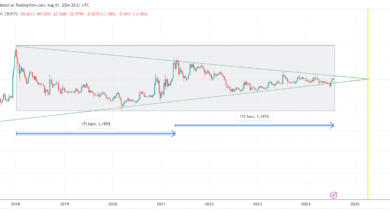Ripple Coin Momentum: XRP Price Surge and Future Prospects

Ripple coin, also known as XRP, has garnered significant attention as momentum returns to the cryptocurrency market. Currently priced at $2.81, Ripple coin has experienced an impressive 25% price increase over the past week, outperforming giants like Bitcoin and Ethereum. This surge is partly attributed to Ripple Labs’ strategic partnership with BNY Mellon to manage its stablecoin, RLUSD, paving the way for transformative growth in the stablecoin market. As Ripple prepares for a potential IPO, industry experts speculate it could raise up to $30 billion, significantly enhancing Ripple’s market presence and possibly influencing XRP’s trajectory. Additionally, the anticipated launch of an XRP ETF by 2025 presents exciting opportunities for investors, positioning Ripple coin as a key player in the evolving cryptocurrency landscape.
The digital currency known as XRP, developed by Ripple Labs, is experiencing a resurgence after a period of stagnation. Recently, there has been enthusiastic speculation surrounding a potential Ripple IPO, which could inject up to $30 billion into the company, rivaling some of the largest initial public offerings in history. Additionally, the proposed introduction of an XRP exchange-traded fund (ETF) could generate significant interest among retail investors, reminiscent of the excitement surrounding Bitcoin’s ETF launch. This is an exhilarating time for Ripple as it navigates the growing demand for stablecoins and their role in the financial ecosystem. With a robust partnership with BNY Mellon and impressive market advancements, XRP seems poised for a compelling future.
Current Trends in XRP Price Dynamics
Ripple coin (XRP) has recently gained momentum after several months of stagnation, experiencing a notable price increase of over 25% in just one week. This resurgence brings XRP’s current trading value to $2.81, positioning it as the third-largest cryptocurrency in the market. Analyst insights suggest that this price upward trend can be partially attributed to Ripple Labs’ strategic move to appoint BNY Mellon as the custodian of its newly introduced stablecoin, RLUSD. As a significant player in the cryptocurrency space, XRP’s performance often rivals that of leading cryptocurrencies like Bitcoin and Ethereum, especially during such pivotal developments.
The recent surge in XRP’s price highlights a growing optimism among investors. As Ripple Labs enhances XRP’s integration into the stablecoin market, particularly through RLUSD’s activities, there’s a tangible expectation for improved speed and cost-efficiency in transactions. The potential competition against Ethereum’s infrastructure strengthens XRP’s position as a viable alternative in the current volatile market, raising investor interest in the third-largest cryptocurrency.
The Impact of Ripple’s Stablecoin Strategy
The stablecoin market is witnessing explosive growth, currently valued at $263 billion with projections suggesting it could soar to between one to two trillion dollars in the coming years. Ripple’s strategic plans to strengthen RLUSD’s presence on the XRP Ledger could be transformative not only for the Ripple coin but for the entire ecosystem. As Ripple’s CEO Brad Garlinghouse has pointed out, stablecoins are poised to play a critical role in shaping the future of finance, with their growing adoption likely to be mirrored in rising XRP valuations.
With Ripple’s new partnership, the transition of RLUSD activities from Ethereum to the XRP Ledger is expected to enhance transaction processing capabilities significantly. Quick transfers and reduced fees could lure more users and investors to XRP, reinforcing its utility on a global scale. The increasing interaction of XRP with stablecoin activities also presents opportunities for new financial products, potentially increasing XRP’s market relevancy and investor confidence.
Ripple’s IPO: Speculations and Market Impact
The ongoing speculation surrounding a potential Ripple IPO has garnered widespread attention in the cryptocurrency industry. Reliable sources suggest that this IPO could potentially raise upwards of $30 billion, presenting an opportunity for Ripple to eclipse other significant tech giants. An IPO of this scale might re-establish Ripple as a dominant force in the market, directly enhancing XRP’s visibility and attractiveness to both institutional and retail investors.
Historically, high-profile IPOs have catalyzed market excitement, as evidenced by the astonishing performance of Circle’s initial public offering. Such excitement might not only rejuvenate interest in the new Ripple stock but also cast a favorable light on XRP, driving more investors to consider purchasing the token. The anticipation surrounding this event illustrates the profound impact that traditional financial market strategies could have on digital asset valuations.
Anticipation for XRP ETFs and Market Effects
The approval of Ripple Spot ETFs in the United States is gaining momentum, with current predictions indicating an impressive 88% likelihood of their launch by the end of 2025. Investors are keenly aware of how the potential introduction of XRP ETFs might mirror the frenzied market activity witnessed during Bitcoin’s ETF launch earlier this year. The possibility of broad access to XRP through ETFs promises to enhance liquidity and attract new investors looking to participate in the crypto space in a regulated manner.
As institutional interest ramps up with the prospect of XRP ETFs, it’s likely that retail investors will also stand to benefit significantly. The successful launch and subsequent trading activity of these ETFs could catalyze a bull run for the Ripple coin, revitalizing market interest and increasing XRP’s liquidity. This anticipated excitement ties back to the idea that the Ripple coin could emerge as a lucrative investment during the upward market momentum, making it a go-to choice as the cryptocurrency sector evolves.
Ripple Coin’s Positioning Against Competitors
As XRP charts its course back into favor, its competitive landscape against Bitcoin (BTC) and Ethereum (ETH) is becoming increasingly evident. Ripple coin’s performance in recent months illustrates its resilience in facing significant market fluctuations. Analysts attribute XRP’s rapid price increase to its functional utility as a digital asset aligned with the growing demand for streamlined payment solutions, giving it an edge over legacy cryptocurrencies.
Moreover, the progress surrounding Ripple’s partnerships, particularly with established financial institutions like BNY Mellon, enhances XRP’s credibility. In contrast to the broader market trends, XRP’s utility-first approach is adaptive to evolving regulatory frameworks, thus instilling confidence among institutional investors who are cautious of market volatility associated with BTC and ETH.
XRP and the Future of Stablecoins
The emergence of Ripple’s RLUSD stablecoin signifies a critical shift in how stablecoins can interact with major cryptocurrencies. By integrating more deeply with the XRP Ledger, the Ripple coin is positioning itself to capture a more significant share of the burgeoning stablecoin market. With predictions suggesting that the stablecoin market could reach trillions in capitalization, Ripple’s efforts signal an intention to lead rather than follow in this developing financial arena.
In addition, Ripple’s vision for stablecoins aligns with the increasing call for digital asset reliability and integration into traditional finance. By playing a direct role in the stablecoin market’s expansion, Ripple coin stands to not only bolster its own value but also promote a broader acceptance and adoption of cryptocurrencies within mainstream finance.
Ripple Labs and its Innovational Strategies
Ripple Labs’ strategic maneuvers, particularly regarding the partnership with BNY Mellon, underscore its commitment to innovation in the digital currency domain. This collaborative approach lays the groundwork for Ripple’s expansion into the more significant realms of stablecoin functionality, promoting a further intertwining of traditional finance with blockchain technology. The execution of this strategy could mark Ripple as an essential player amidst evolving consumer needs for secure and efficient transaction mechanisms.
Furthermore, Ripple’s ongoing efforts reflect a broader trend in the cryptocurrency landscape—innovating to meet regulatory expectations while enhancing user experience. As authorities formulate clearer guidelines surrounding cryptocurrencies and stablecoins, Ripple Labs is positioning the Ripple coin to comply and thrive, anticipating future regulations that seek to integrate digital assets within existing economic frameworks.
Regulatory Developments Influencing XRP
As regulations continue to evolve, Ripple is actively positioning itself as a compliant entity in the cryptocurrency ecosystem. The passing of the GENIUS Act by the U.S. Senate could potentially open doors for enhanced operational efficiencies within Ripple, especially for its RLUSD stablecoin. Thriving in a regulated environment not only solidifies Ripple’s standing but also potentially boosts investor confidence, which is crucial for XRP’s sustained growth.
In an environment rife with regulatory challenges, Ripple’s proactive stance serves as a potential model for compliance within the cryptocurrency sector. A well-regulated stablecoin landscape could increase XRP’s usability and limit market volatility, thereby attracting more traditional investors who were previously hesitant due to perceived risks. Ripple’s advances indicate intricate planning for a future where compliance and innovation go hand-in-hand.
Long-Term Outlook for Ripple Coin Investors
Given the current trajectory of Ripple coin and its associated innovations, the long-term outlook appears increasingly favorable for investors. As XRP potentially positions itself as a leading stablecoin competitor and increases its market share, investors can expect to see not only growth in market capitalization but also a stabilization of value amidst volatility. This resilience could enhance the attractiveness of XRP as part of a diversified investment strategy.
Moreover, as Ripple Labs continues to navigate the intricate landscape of partnerships, regulatory environments, and technological advancements, investors should remain vigilant for any developments that might influence XRP’s market dynamics. The implication is that a strong foundation coupled with strategic foresight can translate into meaningful returns for those willing to hold XRP in anticipation of future growth.
Frequently Asked Questions
What factors are contributing to the recent XRP price increase?
The recent XRP price increase can be attributed to a number of developments, including the appointment of BNY Mellon as the custodian of Ripple’s stablecoin, RLUSD. This integration on the XRP ledger enhances transaction processing efficiency, further boosting XRP’s performance in the market.
How does Ripple Labs impact the stability and growth of the stablecoin market?
Ripple Labs plays a significant role in the stablecoin market by providing innovative solutions such as RLUSD, which improves transaction speed and cost-effectiveness. CEO Brad Garlinghouse believes stablecoins could reach a market cap of $1 to $2 trillion, underlining Ripple’s importance in this space.
What is the significance of Ripple’s IPO for XRP investors?
Ripple’s potential IPO could raise substantial capital, possibly up to $30 billion, drawing significant media attention. This excitement surrounding the IPO is likely to attract new investors to XRP, potentially driving its value upwards.
Are XRP ETFs likely to be approved soon?
The approval of XRP Spot ETFs appears increasingly likely, with predictions of an 88% chance of launch by the end of 2025. This could create a significant market surge, akin to the anticipation that surrounded the Bitcoin ETF launch.
How might the approval of XRP ETFs affect the price of Ripple coin?
The approval of XRP ETFs could lead to an influx of investment and increased demand for Ripple coin, potentially driving the price higher as retail and institutional investors capitalize on new trading options.
What role does BNY Mellon play in the future of Ripple’s stablecoin?
BNY Mellon’s role as the main custodian of Ripple’s stablecoin RLUSD may significantly enhance its market presence by providing secure, efficient transaction capabilities. This partnership aims to bolster XRP’s competitiveness in the stablecoin market.
Can Ripple coin reach $5 amidst the upcoming crypto bull run?
While predictions vary, many analysts believe that Ripple coin (XRP) may have the potential to reach $5 during the next crypto bull run, especially with the positive developments around its stablecoin, potential IPO, and possible ETF approvals.
Why is the stablecoin market expected to grow, and what does this mean for Ripple coin?
The stablecoin market is expected to grow due to increasing demand for digital currencies with stable valuations. As a significant player in this market, Ripple’s investments and innovations in stablecoins could enhance the prospects for Ripple coin (XRP).
What distinguishes Ripple coin from Bitcoin and Ethereum?
Ripple coin differs from Bitcoin and Ethereum by focusing on facilitating international transactions and working with financial institutions. Its partnerships and innovations position it as a competitive alternative, especially with the recent price surge.
How does Ripple’s strategy showcase its long-term vision for XRP?
Ripple’s strategy emphasizes patience, focusing on building sustainable partnerships and innovative products like RLUSD for long-term utility. Investors are encouraged to hold XRP as Ripple seeks to influence the evolving financial landscape.
| Key Points | Details |
|---|---|
| Current Market Performance | Ripple coin (XRP) is trading at $2.81, a 25% increase over the past week, outperforming Bitcoin and Ethereum. |
| Partnership with BNY Mellon | Ripple Labs appointed BNY Mellon as the main custodian of its stablecoin RLUSD, which could enhance XRP’s market position. |
| RLUSD Activity | 87% of RLUSD activities are currently on the Ethereum blockchain, indicating potential for improved performance on the XRP ledger. |
| Market Cap of Stablecoin Market | Currently valued at $263 billion with potential to grow to $1-2 trillion in the coming years. |
| Ripple IPO Speculation | Speculation on Ripple’s IPO could raise up to $30 billion, potentially making it the largest IPO in history. |
| XRP ETFs | Estimated 88% chance of an XRP index fund launching by the end of 2025, likely to create buzz similar to Bitcoin’s ETF. |
| CEO’s Wealth Increase | Ripple’s CEO Brad Garlinghouse’s wealth has surged to $10 billion due to XRP’s price increase. |
| Long-Term Outlook | Analysts suggest it may take patience to see significant market impacts from Ripple’s initiatives. |
Summary
Ripple coin has shown significant momentum lately, highlighted by its recent price surge and strategic partnerships. As Ripple Labs positions itself with innovative solutions such as the RLUSD stablecoin and speculations of an IPO, investors and market analysts are keenly watching. With a potential boom in stablecoins and the anticipated launch of XRP ETFs, the future looks promising for XRP holders seeking to capitalize on the evolving cryptocurrency landscape.



